My Favorite Mistake: Learning Without Blame in Business and Leadership
My Favorite Mistake is a podcast about learning without blame in business and leadership.
Despite the name, it’s not just my favorite mistake—it’s yours, it’s ours, and it’s what we can all learn from when things don’t go as planned.
Hosted by author and consultant Mark Graban, each episode features honest conversations with leaders, executives, entrepreneurs, and changemakers about a meaningful mistake they made—and what they learned after things went wrong. How they responded. How they improved. How they grew as leaders.
This isn’t a show about failure theater, gotcha moments, or simplistic “lessons learned.” It’s about how real people reflect, improve, and lead better in complex organizations—without scapegoating, shame, or hindsight bias.
What You’ll Hear
• Leadership and management mistakes that reshaped careers, teams, and organizations
• How teams and leaders learn without blaming individuals
• Insights about culture, systems, decision-making, and psychological safety
• Practical lessons drawn from real experience, not abstract theory
Guests come from business, healthcare, technology, sports, entertainment, government, and academia, sharing stories that reveal how learning actually happens.
The Perspective
Mark brings a systems-thinking lens grounded in Lean management, continuous improvement, and psychological safety. The focus is less on who messed up and more on what the system taught us.
Who This Podcast Is For
• Leaders and managers who want to learn from mistakes without blame
• Executives working to build healthier, more resilient cultures
• Professionals who believe improvement starts with reflection, not punishment
My Favorite Mistake: Learning Without Blame in Business and Leadership
My Favorite Mistake is a podcast about learning without blame in business and leadership.
Despite the name, it’s not just my favorite mistake—it’s yours, it’s ours, and it’s what we can all learn from when things don’t go as planned.
Hosted by author and consultant Mark Graban, each episode features honest conversations with leaders, executives, entrepreneurs, and changemakers about a meaningful mistake they made—and what they learned after things went wrong. How they responded. How they improved. How they grew as leaders.
This isn’t a show about failure theater, gotcha moments, or simplistic “lessons learned.” It’s about how real people reflect, improve, and lead better in complex organizations—without scapegoating, shame, or hindsight bias.
What You’ll Hear
• Leadership and management mistakes that reshaped careers, teams, and organizations
• How teams and leaders learn without blaming individuals
• Insights about culture, systems, decision-making, and psychological safety
• Practical lessons drawn from real experience, not abstract theory
Guests come from business, healthcare, technology, sports, entertainment, government, and academia, sharing stories that reveal how learning actually happens.
The Perspective
Mark brings a systems-thinking lens grounded in Lean management, continuous improvement, and psychological safety. The focus is less on who messed up and more on what the system taught us.
Who This Podcast Is For
• Leaders and managers who want to learn from mistakes without blame
• Executives working to build healthier, more resilient cultures
• Professionals who believe improvement starts with reflection, not punishment
My Favorite Mistake: Learning Without Blame in Business and Leadership
Episodes

Monday Apr 28, 2025
Monday Apr 28, 2025
My guest for Episode #306 of the My Favorite Mistake podcast is Betsy Pepine, a serial entrepreneur in real estate and the founder of Pepine Realty. Betsy leads a top-producing real estate team consistently recognized by The Wall Street Journal and has built a family of companies that includes a property management firm, title company, real estate school, and a nonprofit.
EPISODE PAGE WITH VIDEO, TRANSCRIPT, AND MORE
She’s also the author of the 2024 book Breaking Boxes: Dismantling the Metaphorical Boxes That Bind Us, which explores the limiting labels and roles we assign ourselves—and how to break free from them.
Betsy’s favorite mistake was starting her brokerage with no clear plan. What began as a solo effort out of her home unexpectedly turned into a team, and eventually a company—but without intentional structure or culture. That all came to a head when her trusted assistant resigned right before a long-overdue family vacation. Her assistant’s honest feedback—about the lack of family, growth, and purpose—was a painful but pivotal wake-up call. Betsy responded not by retreating, but by reading leadership books on her cruise, hiring a coach, and reinventing her company with clear values and a defined mission.
In our conversation, Betsy shares how she rebuilt Pepine Realty around core values like family, impact, and growth. She talks about initiatives like creating a nonprofit to address housing affordability and designing career paths that include a rare salaried-agent model in real estate. We also discuss the power of learning from mistakes—including how her team shares “learnings” each week in a psychologically safe environment that accelerates growth and prevents repeated errors.
Betsy’s story is about far more than real estate—it’s about leadership, self-awareness, and responding to failure with action. Her perspective will resonate with anyone building a team or culture where people feel seen, supported, and inspired to improve.
Questions and Topics:
What’s your favorite mistake?
What did your assistant say when she resigned—and how did that become a turning point for you?
How did you respond to that feedback, and what changes did you make in your business?
What were the first steps you took to start shaping your company culture?
Did you create your mission and core values on your own at first?
How did you define and build a “sense of family” inside your business?
What inspired you to create a nonprofit—and how does it fit into your overall mission?
What’s the purpose behind your unique salaried agent role?
How do you help team members shift roles if they’re not in the right seat?
What’s the weekly “learnings” segment in your team meeting—and how does it support growth?
How do you balance encouraging learning from mistakes without being careless?
Do you use checklists or systems to help prevent mistakes?
What prompted you to write Breaking Boxes, and what’s the core message of the book?
How do we recognize when we’re stuck in a metaphorical box—and how do we step out of it?
What are the main fears that keep people in those boxes?
Can you share how fear of failure has influenced your thinking over time?
What does it take to build resilience to change?
What’s your approach to managing fear of loss—especially status or social connections?
How did your connection with Barbara Corcoran come about?
What lessons have you learned from Barbara as a mentor?
What advice would you give someone thinking of starting a business without a clear plan?
What do you think are the best reasons for someone to get into real estate?
How do you view the role of a real estate agent during high-stress life transitions?
How do you create consistency in values across your family of companies?
How do you support women reentering society after incarceration—and what’s the deeper “why” behind that work?
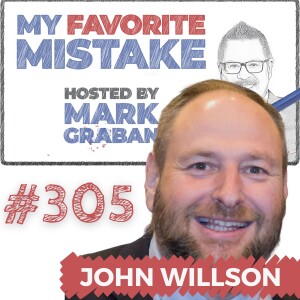
Sunday Apr 20, 2025
Sunday Apr 20, 2025
My guest for Episode #305 of the My Favorite Mistake podcast is John Willson, Executive Director of SOAR, the world’s premier outdoor adventure program serving youth with ADHD and learning disabilities.
Episode page with video and more
With over 30 years of experience, John is a passionate advocate for experiential education and life skills development through structured, strengths-based environments. SOAR, which stands for Success Oriented Achievements Realized, supports young people ages 8 to 25 through summer camps, boarding schools, and gap year programs focused on building confidence and resilience.
John’s favorite mistake took place on Mount Katahdin, the northern end of the Appalachian Trail, where he unknowingly summited a false peak in poor weather conditions. Faced with a difficult decision—turn back through a dangerous route he already knew or forge ahead into unknown terrain—he pressed on despite worsening conditions. Although it was arguably the “wrong” decision in the moment, it led to a powerful sense of accomplishment and a safer descent than expected. John describes this as a “happy mistake” that taught him about risk, perseverance, and the sometimes unexpected rewards of pressing forward.
In our conversation, John shares how this philosophy of “failing forward” underpins SOAR’s mission. He explains how their structured programs help kids with ADHD and learning differences build critical life skills, develop self-awareness, and form friendships—often for the first time. We also explore the importance of creating environments where neurodiverse individuals are supported, understood, and encouraged to take safe risks, with a strong network behind them.
John and I also discuss the evolving understanding of ADHD, the challenges of diagnosis, and how labels matter less than building strategies that work. He shares practical advice for parents and adults alike, emphasizing the role of support systems, coaching, and compassion. Whether you’re a parent, educator, or someone navigating your own neurodiversity, this episode offers insights into how mistakes—when supported by reflection and community—can lead to breakthroughs.
Questions and Topics:
What’s your favorite mistake?
Is it true that one of your most common mistakes is people misspelling your last name?
Did you go back and climb Mount Katahdin again on a clearer day?
What do you mean by “summit fever”?
If that decision had led to a bad outcome, would it change how you reflect on it?
What lessons did you take away from that pattern of decision-making?
What are some ways the SOAR summer camp is tailored for kids with ADHD or learning disabilities?
How much of the benefit comes from being with other kids who share similar strengths and challenges?
How does being in that kind of environment help kids feel more accepted?
How does SOAR help kids who struggle to make friends build relationships?
When were you diagnosed with ADHD?
How did that diagnosis shape your connection to SOAR and the work you do?
How many SOAR staff members also have ADHD, versus being trained to support it?
What kind of person tends to thrive on your staff?
What’s your take on people wondering if they have ADHD or if it’s anxiety or something else?
What matters more—getting a diagnosis or developing the right coping strategies?
What advice would you give someone recently diagnosed with ADHD—or who suspects they might have it?
Can you talk about the role of support systems in success for neurodiverse individuals?
What’s your view on younger people being more open about neurodiversity in the workplace?
Can you share some practical first steps after receiving an ADHD diagnosis?
Why is identifying your support network such a crucial part of success?
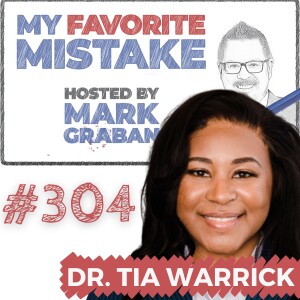
Monday Apr 14, 2025
Why Staying Silent Was Her Favorite Mistake — Dr. Tia Warrick
Monday Apr 14, 2025
Monday Apr 14, 2025
My guest for Episode #304 of the My Favorite Mistake podcast is Dr. Tia Warrick, a clinical research leader, epidemiologist, author, and entrepreneur who has spent nearly a decade working in the pharmaceutical and biotech industries.
Episode page with video, transcript, and more
She’s the founder of Lesous Consulting, a firm dedicated to supporting clinical research professionals and organizations through education, business analytics, and strategic consulting. With a strong academic background—including a doctorate in health science and clinical health education—Dr. Warrick is committed to empowering the next generation of researchers and bringing more awareness to the vast career opportunities within clinical research.
In this episode, Dr. Warrick shares her "favorite mistake"—not speaking up for herself early in her career. She candidly reflects on a time when she took on significantly more responsibilities than her job description called for but hesitated to advocate for a promotion or raise. Her story highlights how staying silent led to missed opportunities and feelings of frustration. But more importantly, she explains how learning to take accountability and find her voice ultimately fueled her confidence, career progression, and entrepreneurial path.
We also explore the broader challenges and opportunities within the clinical research industry, especially for early-career professionals who may not realize the variety of roles available. Dr. Warrick discusses the importance of mentorship, the need for greater visibility into clinical research career paths, and her motivation for writing Burst the Bubble, a book designed to inform and inspire future talent in the pharmaceutical world. She also touches on how she now teaches others to confidently advocate for themselves—whether during salary negotiations or while shaping their career direction.
Questions and Topics:
What’s your favorite mistake, and what did you learn from it?
Was your early role as a clinical research coordinator before or after your advanced degrees?
When did you realize you should have spoken up for yourself sooner?
Was there a mentor or moment that helped you come to that realization?
After receiving a small raise, did you try to advocate for more or take another path?
Do you share this lesson with students or early-career professionals you mentor?
How do you coach others on negotiating compensation and advocating for themselves?
Why is it especially important to speak up early in your career?
What are some misconceptions people have about roles in clinical research?
How do you raise awareness about the breadth of opportunities in the field?
How strong is the job outlook in clinical research, and how might AI impact it?
What was the inspiration behind founding Lesous Consulting?
What leadership lessons have you learned so far as a new entrepreneur?
How do you create a culture where people feel safe to speak up and share feedback?
What does psychological safety look like in your company and classroom?
Can you tell us about the AI platform you’re developing and how it supports clinical research?
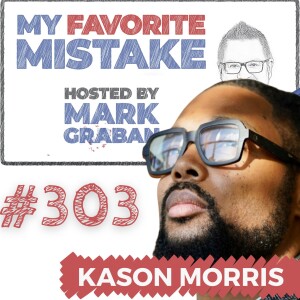
Monday Apr 07, 2025
Why the Corporate Ladder Was My Biggest Mistake — Kason Morris
Monday Apr 07, 2025
Monday Apr 07, 2025
My guest for Episode #303 of the My Favorite Mistake podcast is Kason Morris, a corporate executive, speaker, coach, and self-described life-work revolutionary. With a career that spans consulting, financial services, and global learning and development leadership, Kason has spent years helping organizations and individuals prepare for the rapidly evolving world of work. He’s also the author of LifeWork Revolution: How to Unplug from the System, Find Your Purpose, and Thrive Beyond the 9 to 5.
Episode page with video, transcript, and more
Kason’s “favorite mistake” was what he calls the relentless climb—his belief that success was defined by job titles, constant hustle, and chasing the next promotion. While his resume showed success, his health, relationships, and sense of fulfillment told a different story. A powerful turning point came when his young daughter mimicked his busy, distracted behavior at home—forcing him to ask: Is this the version of myself I want to model? From that moment, Kason began a process of reflection and reinvention, applying design thinking to life and work.
Mark and Kason explore topics like life-work synergy vs. work-life balance, how AI is reshaping the future of work, and why psychological safety and transparency are foundational for sustainable innovation. Whether you're a burned-out professional, a leader trying to engage your team, or someone curious about navigating change, this conversation offers inspiring lessons about slowing down, designing better systems, and living more intentionally.
Questions and Topics:
What is your “favorite mistake,” and why does it stand out to you?
When did you first realize that your definition of success might be off track?
What roles or promotions were part of that “relentless climb” in your career?
Did you receive feedback from your family, or was your shift more self-reflective?
What was the moment with your daughter that became a wake-up call?
How did you start making changes after that realization?
What does the phrase “designing a better life” mean to you in practice?
How did your professional experiences in product and organizational design influence your life design approach?
What is “life-work synergy,” and how is it different from work-life balance or integration?
How did your new perspective influence your transition into your current role?
How do you define the “future of work,” and what are the key capabilities people need to thrive in it?
What are your thoughts on AI—especially how individuals can partner with it effectively?
What are some common mistakes people or companies make when approaching AI and new technologies?
What’s your take on the return-to-office debate and how it fits into the future of work?
Why is employee experience becoming such a critical focus for organizations?
What advice do you have for individuals trying to future-proof their careers?
What do organizations need to do culturally to foster innovation and engagement?
In your coaching practice, who typically reaches out to you—and how can they learn more?
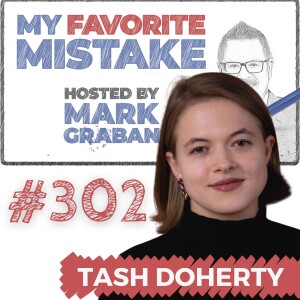
Monday Mar 31, 2025
A Career Mistake That Got Me Fired—and Changed Everything (Tash Doherty)
Monday Mar 31, 2025
Monday Mar 31, 2025
My guest for Episode #302 of the My Favorite Mistake podcast is Tash Doherty, a British-Irish-American author, blogger, and podcaster currently based in Mexico City. A graduate of the Wharton School at the University of Pennsylvania, Tash previously worked in analytics for Postmates and Vox Media.
Episode page with video, transcript, and more
Today, she is the creator of Miss Educated—a popular blog and podcast covering business, pleasure, and women's health. Tash is also the author of the coming-of-age young adult novel These Perfectly Careless Things, self-published in 2023. She gained viral attention on TikTok by openly sharing her experiences with birth control.
Fresh out of Wharton at age 23, Tash joined Postmates in San Francisco, working in analytics. When offered a team change, Tash ignored her gut instinct and reluctantly joined a team run by a manager whose working style clashed sharply with her own. Within months, their professional relationship deteriorated, leading to Tash's unexpected firing just two weeks before the company conducted widespread layoffs.
Initially painful, this mistake forced Tash to reassess her career direction, ultimately opening the door to writing, entrepreneurship, and creative independence—turning a devastating setback into her favorite mistake.
In this episode, we also discuss Tash’s insightful critique of technology companies and their unintended contributions to economic inequality, her process of transforming a teenage passion project into a published novel, and practical advice on balancing creativity with financial sustainability.
Questions and Topics:
What’s your favorite mistake?
Were there early signs of trouble with your boss, Sumit, or did problems develop later?
How did you choose Postmates as your first job after graduating from Wharton?
Did your poor relationship with Sumit impact your job performance?
Was it hard to trust another company or manager after that experience?
Did you ever consider starting your own company again after leaving Postmates?
Do entrepreneurs have a responsibility to reduce economic inequality, or is that up to policymakers?
What specific mistakes do you see tech companies making right now?
What led you to write your article, "How Tech Is Ruining the World"?
Can you elaborate on how tech companies like Postmates worsen inequality?
What did you mean when you described tech workers as being "incurious about the machine"?
Is the tech industry truly improving society or causing greater harm?
How should entrepreneurs or policymakers handle technologies that cause harm when scaled?
Tell us about writing your book, These Perfectly Careless Things—how did it evolve over time?
How do you decide when your writing is finished and ready to publish?
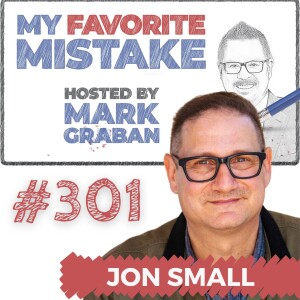
Monday Mar 24, 2025
The Career Mistake That Forced Reinvention — Jonathan Small
Monday Mar 24, 2025
Monday Mar 24, 2025
My guest for Episode #301 of the My Favorite Mistake podcast is Jonathan Small, an award-winning journalist, editor, podcast host, and producer based in Los Angeles.
Episode page with video and more
As president of Strike Fire Productions, he has built a diverse career that spans magazine editing at top publications—from Child Magazine to Maxim—and pioneering roles in digital media and podcasting. Known for his candid storytelling and willingness to embrace risk, Jon has transformed professional setbacks into defining career moments, including leaving a cushy executive role to reinvent himself in a rapidly changing media landscape.
He's also the podcast of a podcast called "Write About Now." Jon's also the author of a book with the same title.
In this episode, Jon recounts his bold decision to leave a high-flying magazine career in New York for a risky, low-paying production role in Los Angeles—a move that, despite its initial challenges (like parting with his beloved cat and facing financial uncertainty), ultimately redefined his career. He shares insights into the evolution of the publishing industry, the shift from print to digital media, and how even seemingly disastrous mistakes can pave the way for reinvention, new opportunities, and personal growth.
Jon also delves into his extensive experience as a writer and interviewer, offering practical advice on common pitfalls in writing and the art of “show, don’t tell.” He emphasizes the importance of embracing imperfect first drafts, the necessity of reading widely to hone one’s craft, and the value of authentic conversation in podcasting—whether as a host or a guest.
Throughout the episode, listeners are treated to vivid anecdotes from his career, tips for leveraging AI in writing, and reflections on how vulnerability and genuine curiosity fuel both compelling storytelling and effective interviews.
Questions and Topics:
What is your favorite mistake?
What prompted you to leave magazine editing for a role in film production?
Did you consider returning to New York after the move?
What was your role at the movie production company?
What are the most common mistakes rookie writers make?
Can you provide an example that illustrates the difference between showing and telling in writing?
What tips do you have for becoming a more effective interviewer?
Based on your experience, what advice would you offer to guests on a podcast?
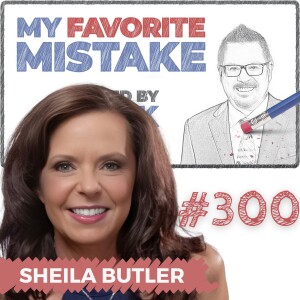
Monday Mar 17, 2025
Sheila Butler: Choosing Passion Over Pay—and What It Really Cost
Monday Mar 17, 2025
Monday Mar 17, 2025
Episode page with video, transcript, and more
My guest for Episode #300 of the My Favorite Mistake podcast is Sheila Butler, a Chief Marketing Officer with over 25 years of experience shaping integrated marketing strategies, building global loyalty programs, and driving customer engagement across both B2C and B2B sectors.
She's the founder of Butler Marketing Group. Her track record includes leadership roles at Disney, JPMorgan Chase, Choice Hotels, and Axiom Bank.
She has a Bachelor of Science in Music and Business/Arts Administration from Indiana University and an MBA from UNC’s Kenan-Flagler Business School.
Today, Sheila shares her unique journey from a childhood passion for music and a stint at Disney, where she learned valuable lessons about the trade-offs between passion and pay. Despite a career start marked by lower-than-expected salaries and tough financial realities, she found that the relationships and experiences she built were invaluable. Her candid storytelling reveals how her early experiences taught her the importance of seizing opportunities—even when they seem like mistakes in the short term—to build a network that ultimately became a cornerstone for her current success.
Now, as the founder of Butler Marketing Group and host of her new podcast, "Marketing Over Bourbon," Sheila focuses on leveraging data-driven strategies to guide marketing decisions. She emphasizes creating safe spaces for experimentation, the power of testing and learning, and the need to balance strategic objectives with creative expression. Interwoven with her passion for bourbon, Sheila’s insights on marketing resonate with listeners who appreciate both practical advice and a genuine, relatable approach to career growth.
Questions and Topics:
What's your favorite mistake?
What are you drinking?
Do you prefer a bourbon Manhattan or a rye Manhattan?
Have you worked with any small distillers or distilling companies?
What drove you to launch your company?
How do you handle it when data contradicts expectations?
What trends are you seeing with companies becoming more data-driven in marketing?
Is half of your ad spend wasted, or is that changing with improved data insights?
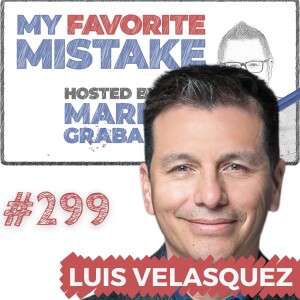
Monday Mar 10, 2025
Luis Velasquez: The Coaching Mistake That Changed How He Builds Leaders
Monday Mar 10, 2025
Monday Mar 10, 2025
My guest for Episode #299 of the My Favorite Mistake podcast is Luis Velasquez, an executive coach in Silicon Valley and a Stanford Graduate School of Business facilitator. He's also the founder of Velas Consulting.
Episode page with video, transcript, and more
Once a university professor and research scientist, Luis helps mid-level managers to C-suite executives around the world learn, adapt, grow, and thrive by helping them how to reframe their challenges and take the most beneficial next step.
His new book, available now, is Ordinary Resilience: Rethinking How Effective Leaders Adapt And Thrive.
Luis is a contributor to Harvard Business Review and Fast Company, and was featured in best-selling author Dorie Clark’s book, The Long Game. An avid endurance athlete, he runs marathons, ultra marathons, and ironman triathlons.
In today's episode, Luis shares his journey from being a university professor and research scientist to becoming a trusted leadership coach in Silicon Valley and a facilitator for the Stanford Graduate School of Business. Luis discusses his new book, Ordinary Resilience: Rethinking How Effective Leaders Adapt and Thrive, and outlines his unique resilience formula—commitment plus persistence multiplied by optimism. He explains that resilience isn't about bouncing back but about unlocking the inherent ability to adapt and thrive by continuously reframing challenges and learning from experiences.
Luis also opens up about a significant mistake in his coaching career. He recounts a time when he delivered 360-degree feedback in a way that was too direct and decontextualized, which led a client to become defensive and ultimately resulted in his contract being terminated. This experience taught him the importance of providing feedback within the context of an individual’s aspirations and personal growth, rather than simply relaying raw perceptions.
The conversation further explores his approach to transforming challenging personalities—like the so-called “brilliant jerks”—into effective leaders, and how embracing and learning from mistakes is key to unlocking resilience and driving both personal and professional growth.
Questions and Topics:
How long is an ultramarathon compared to a standard 26.1-mile marathon?
Given your diverse career, what is your favorite mistake—and what did you learn from it?
Should we express our degree of certainty when stating facts?
How do you define resilience in leadership?
How do you identify and connect with high-value, challenging employees—is it via referrals or direct outreach?
How often do you coach not only the “brilliant jerk” but also intervene with their teams?
What role does fear play as a catalyst for growth—is it simply about reframing it?
Have you observed leaders effectively fostering optimism among their teams?
What does “embrace the suck” mean to you, and why is it a pivotal concept in your book?
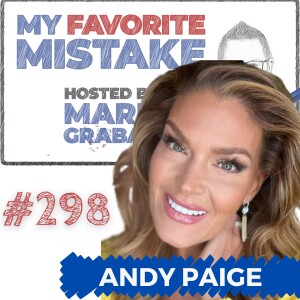
Monday Mar 03, 2025
Andy Paige: The Mistake That Changed Her Life and Launched an Invention
Monday Mar 03, 2025
Monday Mar 03, 2025
My guest for Episode #298 of the My Favorite Mistake podcast is Andy Paige. She's a soap opera actress, podcast host, QVC guest host, and national beauty/image/lifestyle expert. As Pearl on ABC's General Hospital, she brings real-life QVC flair to captivating audiences with innovative advertising.
Episode page with transcript, video, and more
She hosts “The Dating Lab with the Hillbilly Yenta,” where she explores modern dating challenges with humor and diverse guests. Her international bestseller, Style on a Shoestring, earned her the title “Budget Bombshell” and inspired frugal style makeovers on TV worldwide.
With standout appearances on NBC’s Celebrity Apprentice, Starting Over, and TLC’s Ten Years Younger, Andy is the go-to expert for red-carpet style and practical image advice. She also delights radio audiences nationwide with playful style tips and has launched successful product lines including her patented GirlyGoGarter® and related accessories.
In this episode, Andy shares the dramatic story of how a miscalculated cliff jump not only resulted in a severe injury but also sparked a journey of innovation that led her to create the revolutionary Girly Go Garter. She reflects on the lessons learned from this life-altering mistake and discusses how it transformed her approach to both her career and personal growth.
She offers insights into the creative process behind her products, the challenges and triumphs of working in fast-paced television environments, and how embracing mistakes can lead to unexpected opportunities. Tune in for an inspiring conversation on resilience, reinvention, and the art of turning errors into stepping stones for success.
Questions and Topics:
What’s your favorite mistake?
Did you hit the edge of the rock when you jumped?
Was your foot catastrophically injured during the fall?
Did you expect a long rehab period and time away from the camera?
How many design iterations did the Girly Go Garter require—and is it still evolving based on feedback?
Did you try pitching your product on Shark Tank?
Did the Girly Go Garter play a role in landing your QVC gigs?
Is QVC always broadcast live?
How far in advance are soap opera episodes completed?
How did your role on General Hospital come about?
As a mother, how do you help your kids learn from mistakes?
Do you allow your natural accent to shine through on set?
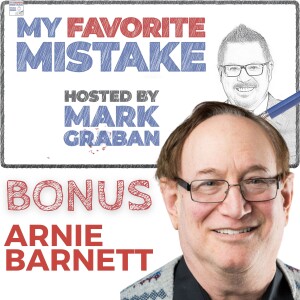
Thursday Feb 27, 2025
Arnold Barnett on Why Flying Is Still Incredibly Safe
Thursday Feb 27, 2025
Thursday Feb 27, 2025
In this special bonus episode of "My Favorite Mistake," host Mark Graban welcomes back Arnold Barnett, a renowned expert in aviation safety, to discuss public perception of air travel safety in light of recent air incidents. They explore common misconceptions about aviation risks, temporal fluctuations in safety data, and the factors contributing to the continuing improvement in aviation safety. Professor Barnett reassures listeners with data-driven insights and addresses the psychological biases influencing our perception of risk.
Episode page with video, transcript, and more
Key Discussion Points:
Public Perceptions vs. Reality: Arnie Barnett sheds light on why recent air travel incidents have caused public apprehension but insists that aviation remains incredibly safe.
Understanding Spasms of Events: Discussion on how statistical anomalies can lead to clusters of negative events but don't necessarily indicate a trend.
The Role of Probability: Barnett explains probability through coin toss analogies, emphasizing that rare clusters of events are expected even when the underlying system is safe.
Historic Comparisons and Data Trends: Insights into how aviation safety has followed a trajectory similar to Moore's Law, with risks decreasing significantly over decades.
Risks in Aviation: Highlighting the contrasts between accidental risks and potential threats from deliberate actions, such as terrorism.
Psychological Aspects of Risk: Exploration of how psychological biases, like availability bias, affect public perception of aviation risk.
Guest Bio:
Arnie Barnett
Arnie Barnett is the George Eastman Professor of Management Science at MIT Sloan School of Management and a pre-eminent expert in aviation safety. He has been recognized with the 2002 President Citation from the Flight Safety Foundation for outstanding contributions to safety and has received multiple teaching honors from MIT Sloan students. Barnett holds a BA in mathematics from Columbia University and a PhD in mathematics from MIT.
Previous Appearance: Arnie Barnett's favorite mistake story in Episode 169: https://www.youtube.com/watch?v=-ffe6bNtxlg
MIT Article: Explore the article on the MIT website detailing aviation safety trends and Moore's Law analogy, as discussed in the episode: https://news.mit.edu/2024/study-flying-keeps-getting-safer-0807
Memorable Quotes:
"If you see a little kid at an American airport, then that kid...is five times as likely to grow up to be president as to perish in the forthcoming flight." — Arnie Barnett
"Fears are deep, and when I respect them, I know many people who are afraid to fly, but I believe this is something we shouldn't be afraid of." — Arnie Barnett
Actionable Takeaways from the Podcast Episode
Stay Informed, Not Anxious:
Guidance: Understand that aviation safety is statistically very high, even amidst rare bursts of incidents. Arnie Barnett explained that the risk levels are closer to zero than perceived, as discussed with the "availability bias" and the statistical explanation regarding recent safety events.
Implementation: Arm yourself with reliable safety data and trends when feeling anxious about flying. Remind yourself that the perception of risk is often inflated by isolated incidents, which are outweighed by the overwhelming safety record of aviation.
Leverage Sound Arguments:
Guidance: Use metaphorical insights, such as Barnett's coin analogy, to effectively communicate the nature of rare events. This helps in understanding that a sudden occurrence of incidents does not necessarily indicate a systematic issue.
Implementation: When discussing risks, employ similar analogies to articulate to others that rare sequences of events do happen without indicating a broader change in safety. This approach can not only assure others but also help you internalize and remain calm about flying.
Focus on Broader Safety Trends:
Guidance: Be aware that deliberate attacks are an area of potential concern, but reassurances on trends are clear from Barnett, who discussed continuous improvements and the extraordinary safety levels in countries like the US, UK, and Canada.
Implementation: When planning air travel, focus on the historical safety record of airlines and recognize that current safety measures are stringent and continuously improving. For example, choosing airlines with exemplary safety records can further mitigate rare and unanticipated risks, providing peace of mind during air travel.
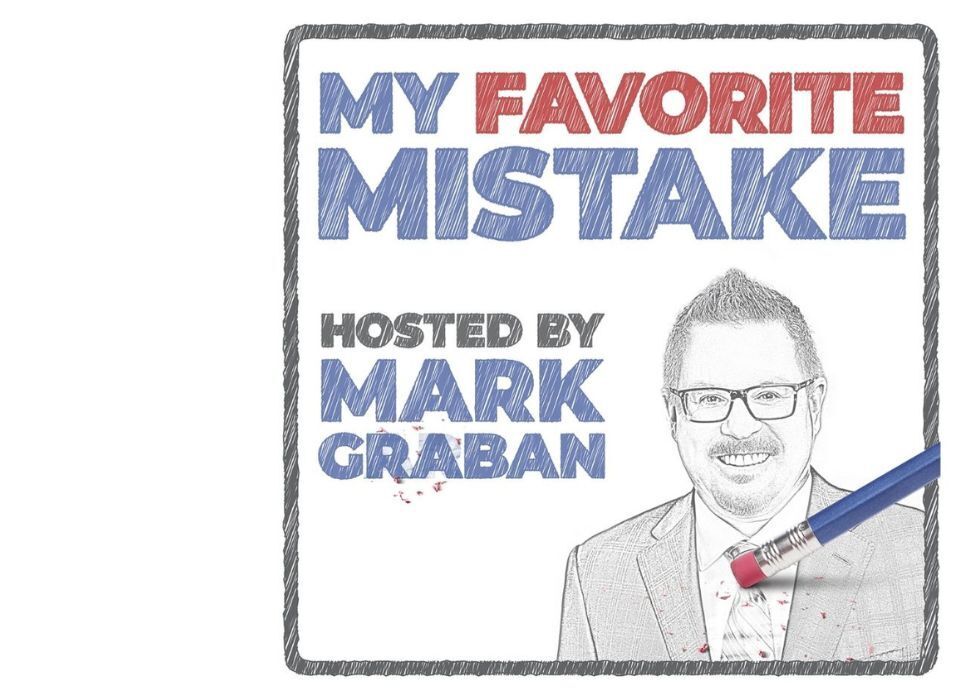
About Mark Graban
Mark Graban is an author, speaker, and consultant, whose latest book, The Mistakes That Make Us: Cultivating a Culture of Learning and Innovation, is available now.
He is also the author of the award-winning book Lean Hospitals: Improving Quality, Patient Safety, and Employee Engagement and others, including Measures of Success: React Less, Lead Better, Improve More.
He serves as a consultant through his company, Constancy, Inc, and is also a Senior Advisor for the technology company KaiNexus.
Mark hosts podcasts, including “Lean Blog Interviews” and “My Favorite Mistake.”
Education: B.S. in Industrial Engineering from Northwestern University; M.S. in Mechanical Engineering, and M.B.A. from the Massachusetts Institute of Technology’s Leaders for Global Operations Program.









